Buckingham Palace said the queen, who was 96, died peacefully at Balmoral Castle, her estate in the Scottish Highlands. Her son became Britain’s new monarch, King Charles III.
World leaders, dignitaries and citizens mourned the death of Queen Elizabeth II.
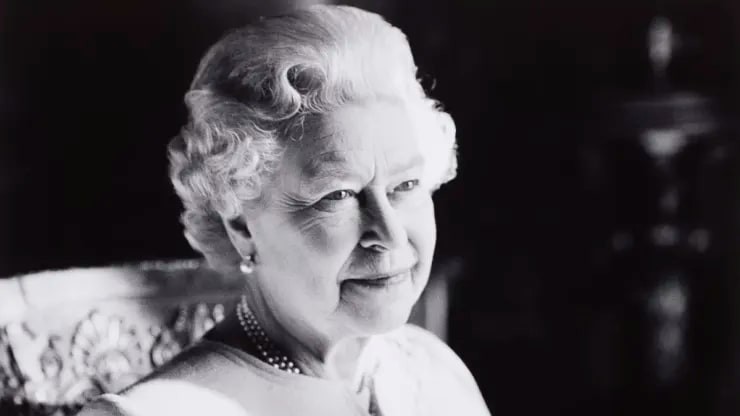 |
| Photo: Jane Bown | Camera Press | Redux |
The UK’s longest-serving monarch died on Thursday at the age of 96, bringing down the curtain on an era dating to February 1952, when the then Princess Elizabeth succeeded her father George VI at the age of 25.
Buckingham Palace said in a statement that the Queen had died “peacefully” at Balmoral Castle, the royal residence in Scotland, according to Financial Times.
With husband Prince Philip by her side, Elizabeth became queen of the United Kingdom, Canada, Australia and New Zealand upon the death of her father, George VI, on Feb. 6, 1952. Her coronation was June 2, 1953.
On Feb. 6, 2022, Elizabeth became the first British monarch to reign 70 years. In honor of the occasion, the United Kingdom and the Commonwealth held a Platinum Jubilee in June 2022.
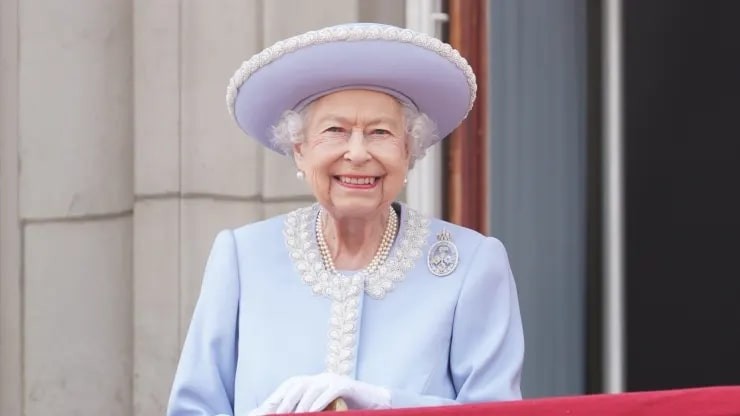 |
| Queen Elizabeth II watches from the balcony of Buckingham Palace during the Trooping the Colour parade the Trooping the Colour parade on June 2, 2022 in London, England. Wpa Pool | Getty Images |
The 96-year-old monarch made an appearance with her family on the balcony of Buckingham Palace during the first day of the four-day-long Platinum Jubilee, waving to tens of thousands of people gathered below and watching an aviation display in her honor. But she was unable to attend events later on during the celebrations due to discomfort, according to CNBC.
Elizabeth’s reign covered a period of massive social, economic, technological and political change. It saw the transformation of the once-global British Empire into a Commonwealth of 52 independent nations headed by the queen, and the country’s entrance into and exit from the European Union. Fifteen prime ministers served under Elizabeth — from Winston Churchill on her accession to the throne in 1952 to Liz Truss, who was sworn in by the frail queen only two days before the monarch’s death was announced.
She also presided over a family that saw tragedy, scandal and turmoil, including the death of former Princess Diana, the association of son Prince Andrew with the late millionaire sex criminal Jeffrey Epstein, and the decision by grandson Prince Harry to seek a more private life with his wife, the former Meghan Markle.
Longest-reigning monarch
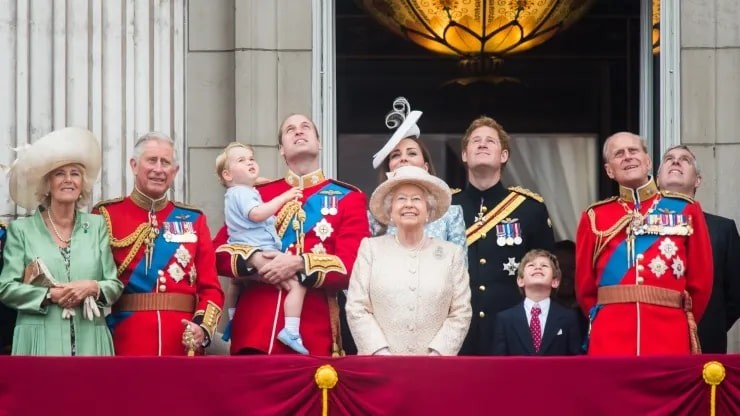 |
| Photo: Samir Hussein | WireImage | Getty Images |
During her time on the throne, Elizabeth took her place on the global stage along with elected leaders and dictators.
Her long reign saw her circling the globe many times: Following her coronation, Elizabeth and Philip took a seven-month tour, visiting 13 countries and logging more than 40,000 miles.
She had met with every U.S. president from Harry S. Truman to Joe Biden, except for Lyndon Johnson. She was entertained at the White House by five presidents — Dwight Eisenhower, Gerald Ford, Ronald Reagan, George H.W. Bush and George W. Bush. She also met five popes, from Pius XII (in 1951 before she was queen) to Francis in 2014.
In 2015, Elizabeth overtook her great-great-grandmother Queen Victoria to become the oldest and longest-reigning British monarch. Upon the October 2016 death of Thailand’s King Bhumibol Adulyadej, ending his 70 years on the throne, she became the world’s longest-reigning monarch and head of state.
She celebrated six jubilees, her 25th, 40th, 50th, 60th, 65th and 70th years on the throne, as well as the marriages of her four children and the births of eight grandchildren and 12 great-grandchildren.
The storybook wedding of her son Charles to Lady Diana Spencer on July 29, 1981, was attended by 2,650 guests at St. Paul’s Cathedral and witnessed by nearly a billion television viewers around the world.
Elizabeth’s reign was also marked by crisis, including two assassinations attempts, in 1970 and 1981 in Australia and New Zealand, respectively. In 1979, her art advisor, Anthony Blunt, was unmasked as a communist spy, and Prince Philip’s uncle, Lord Mountbatten, was killed by an Irish Republican Army bomb.
Crowds gather at Buckingham Palace to pay respects to Queen
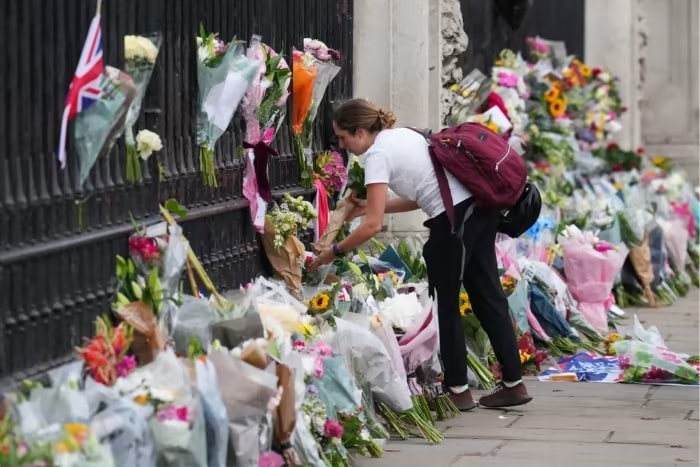 |
| Flowers are placed at the gates to Buckingham Palace © Getty Images |
Hundreds of people gathered at Buckingham Palace on Friday morning to pay their respects to the Queen.
Many laid bouquets of flowers in front of the railings with messages of condolence attached.
Artist Adam Dant and his dog Watson brought a marmalade sandwich with a picture of Paddington Bear on a card and the words “Thank you (for everything)”, a reference to the Queen’s appearance in a skit with the popular children’s character during her platinum Jubilee celebrations earlier this year.
“I’m here for all the obvious reasons,” he said. “And this sandwich is the ultimate offering from a canine.”
Actor Adrian Dannatt, who arrived in London from Paris on Thursday evening, said: “I was here when Prince Philip died and so when I got off the Eurostar and heard the news, according to Financial Times.
King Charles to return to London and address nation
The UK has begun its first full day of 10 days of mourning the death of Queen Elizabeth II, as King Charles III prepares to address the nation.
The King, due to give a televised address at 6pm on Friday, will return to London from Balmoral Castle with Camilla, the Queen Consort. Queen Elizabeth died in Scotland on Thursday at the age of 96.
The King’s formal accession to the throne and proclamation as monarch will take place on Saturday.
The Speaker of the House of Commons has replaced Friday’s planned parliamentary sitting with one from noon until 10pm, to allow members to give their tributes to the late monarch.
Parliament will sit on Saturday from 2pm, when senior members of the house will swear an oath of allegiance to the King.
The Church of England has called for parish churches, chapels and cathedrals to ring their bells for an hour starting at noon. St Paul’s Cathedral in central London will hold a special service, with many churches following suit.
The King on his return to London will hold his first audience with Prime Minister Liz Truss.
A ceremonial bell at Windsor Castle will toll 96 times, once for each year of the late queen’s life. A 96-gun salute will be fired in Hyde Park.
What to expect: How King Charles III might rule
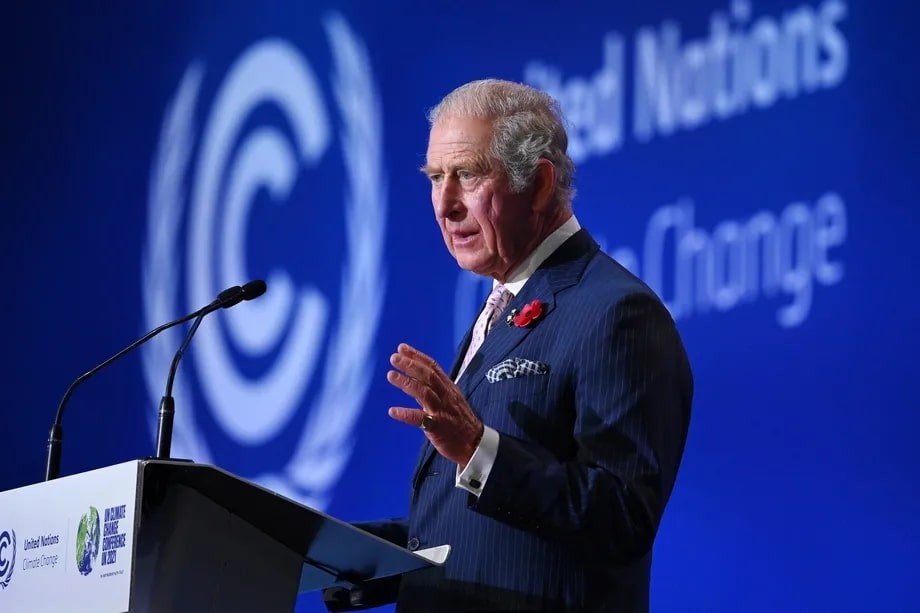 |
| Charles, Prince of Wales, speaks during the opening ceremony of the COP26 climate conference in Glasgow, Scotland, in November 2021. He will now ascend the throne to replace Queen Elizabeth II. Jeff J Mitchell/Getty Images |
Charles is now officially King Charles III. The coronation — the crowning ceremony for the new sovereign — won’t happen for a number of months, but his status as king is already set.
As king, Charles is also Britain’s head of state, as well as the head of state for other countries in the “Commonwealth Realm” who still recognize the monarch, including Australia, Canada, and the Bahamas. In 2018, the queen also named Charles the head of the Commonwealth of Nations, which is the United Kingdom plus a group of 53 countries that have cultural or political ties to it, including as part of its former empire.
Charles has been the longest serving heir-apparent, and his positions, causes, and scandals have been scrutinized his entire life. Though Charles has taken on more and more royal duties in recent months, it does not change the momentousness of this succession. “There will be moments of uncertainty, and those uncertain moments will be in every field where the monarch has a position,” said Onyeka Nubia, a historian at the University of Nottingham. “There will be uncertainty politically, uncertainty perhaps culturally, perhaps uncertainty socially.”
The British monarchy has always been a tool of soft power, both within the country and without. Charles, after waiting 70 years in the wings, is likely to have his own views on how he can use his soft power and influence. His public record may offer some clues as to how he will rule, but so might the institution of the monarchy itself. “The reason the monarchy has survived is by constantly searching out new roles for itself,” said Ed Owens, a historian of the modern British monarchy. And this may be the guiding principle for the new king: making sure the monarchy survives.
The many changes and challenges Charles faces
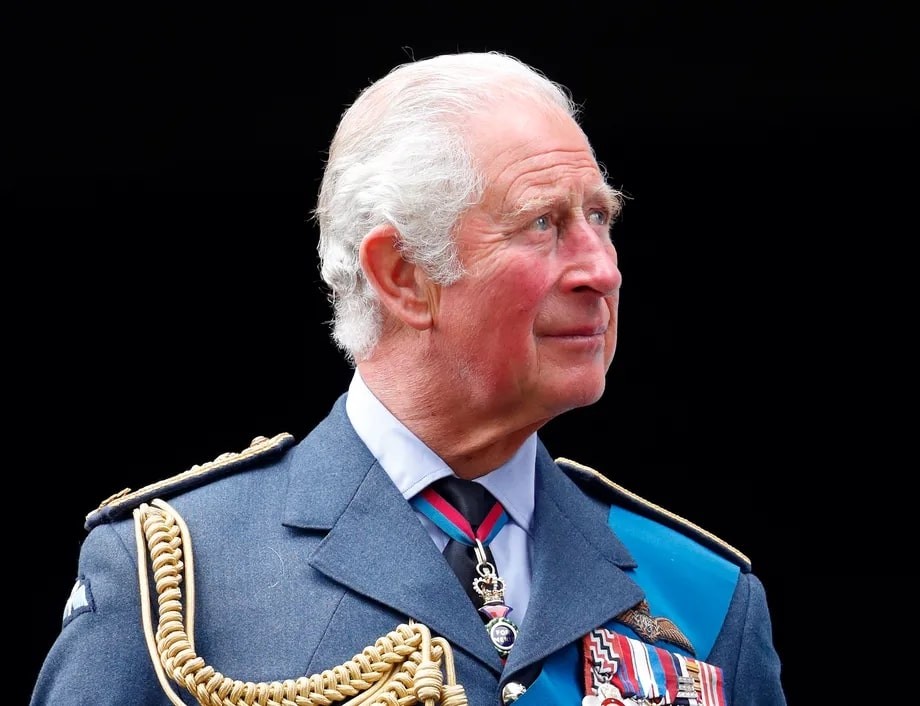 |
| Charles, Prince of Wales, in September 2021. Max Mumby/Indigo/Getty Images |
Charles may be the climate change king. But he will also have to grapple with where the institution of the monarchy fits with Britain’s place in the world, and with the very idea of Britishness.
As experts pointed out, the British monarchy is a political institution, but it is also supposed to be above politics. The royal family takes this very, very seriously, even as they use their influence to try to further Britain’s aims. “The key ethos of the House of Windsor is that they’re there by some chance of birth, and it’s their duty to perform these functions which, on the whole, are incredibly, incredibly boring, which they don’t get much out of personally, but they feel it’s important to keep the system of government going,” said Philip Murphy, the director of history and policy at the University of London. “And therefore, yes, there is a duty to the nation and to the British people.”, according to Vox.
Whether King Charles can — or should — maintain his role as head of the Commonwealth is one of the questions he will likely face. He visited Barbados just as it cast off the queen, a sign that the monarchy still sees value in these Commonwealth ties. But as Newman said, a lot of this notion of the Commonwealth came from the queen herself: “Once she’s gone, I think this could unravel.” That could be destabilizing, at least in how Britain thinks of itself and its place in the world.
This is especially acute as the UK is trying to define itself in the wake of Brexit. The Conservative government has touted an idea of “Global Britain” in the post-Brexit world, one where the UK reasserts its power and influence apart from the European Union. That means trade deals with the rest of the world, but also in its strong backing of Ukraine. Figuring out what role the Commonwealth will play in British foreign policy may also be part of that.
And then there is the question of Britain itself. The monarchy has traditionally played a role in reinforcing these ties of “Britishness” — that is, among England, Scotland, Wales, and Northern Ireland.
But Brexit has strained some of the ties within the United Kingdom. It has revived the question of Scottish independence. It has raised tricky questions for the status of Northern Ireland, and it makes the reunification of Ireland a more likely possibility. Even Wales has seen increasing support for independence.
The breakup of the Union isn’t imminent, or even very likely during Charles’s tenure, but he will have to grapple with it. One thing every Brit had in common was the queen; now the question is whether King Charles III can play a similar unifying role. “It’s really Britishness that’s going to be at the fore — and the degree to which the monarchy can help, cement, or solidify some sort of supranational British identity, which is going to be imperative if Britain remains intact,” said Arianne Chernock, a professor of British and European history at Boston University.
Those challenges pile on top of the greatest instability Europe has seen in decades: Russia’s invasion of Ukraine and the West’s response have exacerbated the Covid- and Brexit-related economic and cost-of-living crises in the UK. But even with these challenges, the British monarchy may not change all that much. Consistency is kind of the monarchy’s thing. How Charles rules, and what causes he takes up, may ultimately be determined by that most of all: the pressure the longest-serving heir faces to keep the institution intact, according to Vox.
Foreign Minister Bui Thanh Son attended the funeral of Queen Elizabeth II
Hundreds of local and foreign royals and global leader are set to attend the funeral of Queen Elizabeth II held by the British royal family at Westminster Abbey at 11am on September 19 (17:00 Hanoi time).






